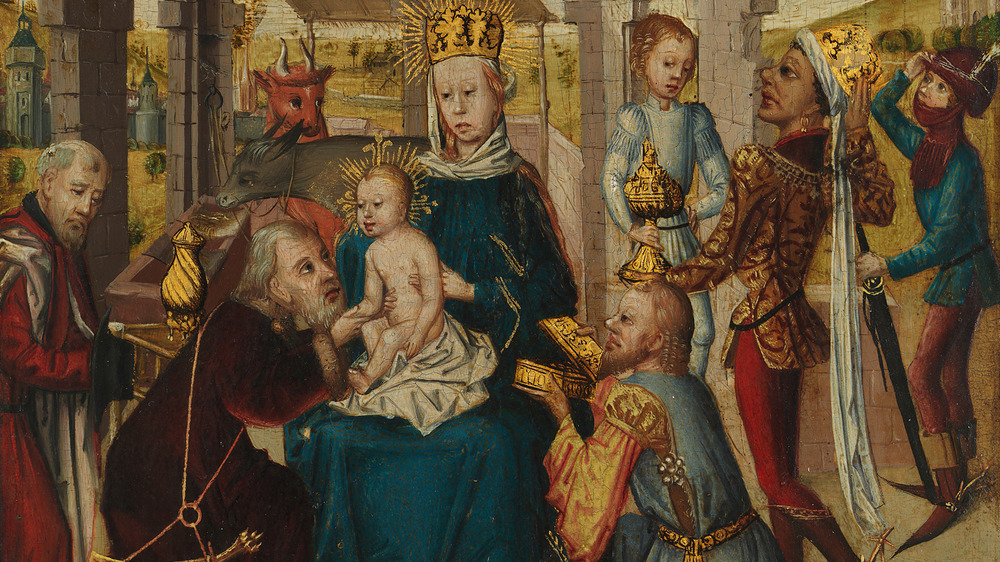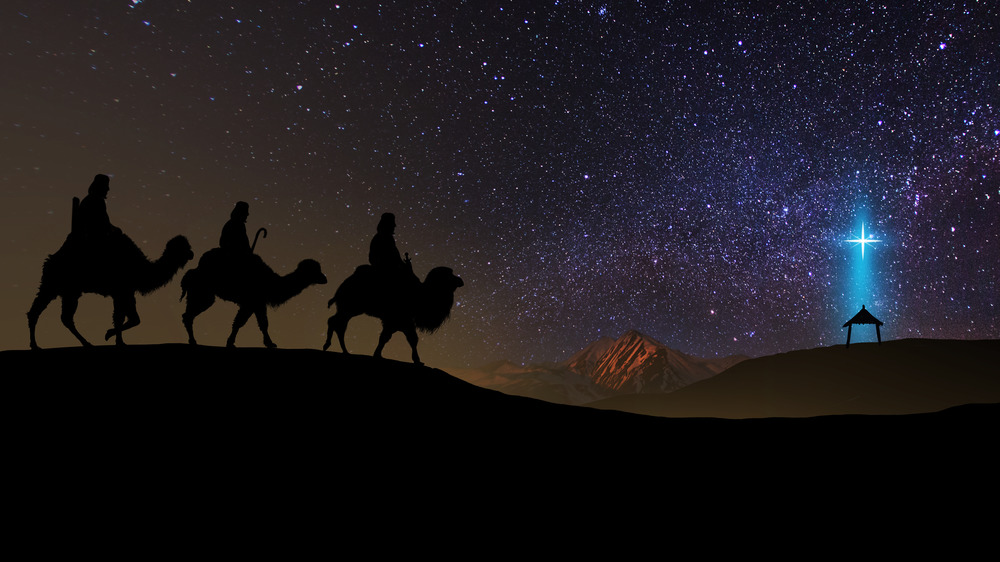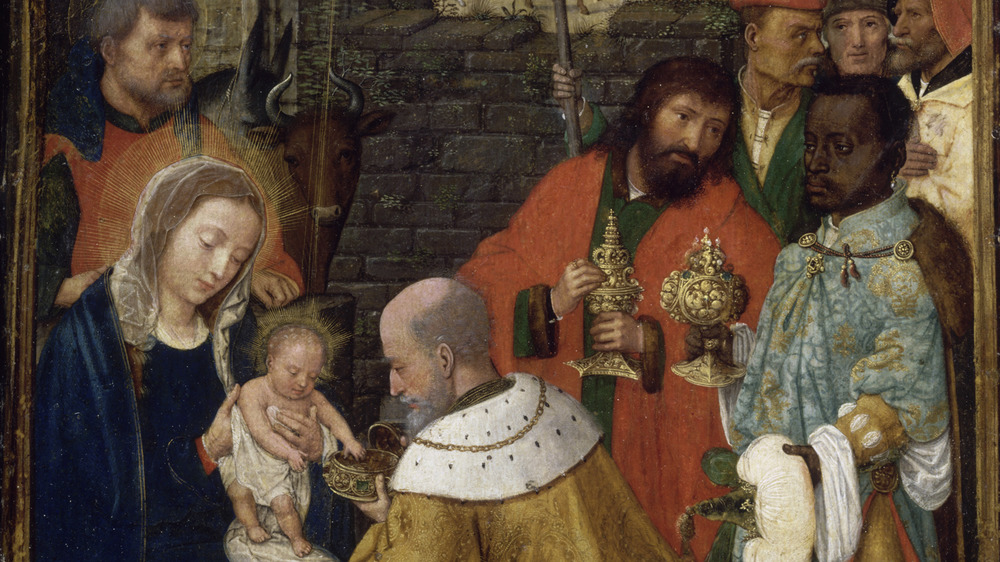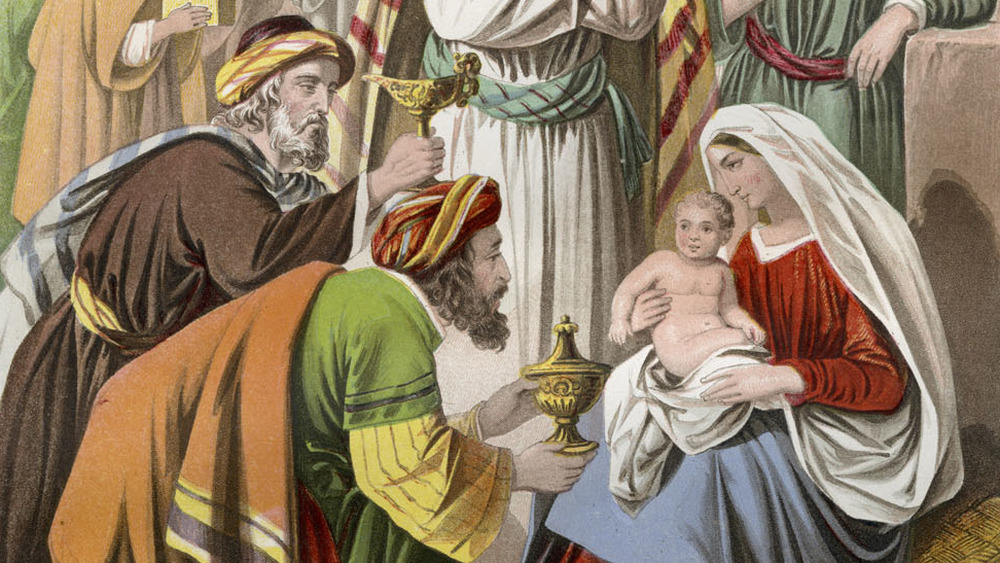Who Really Were The Three Wise Men?
Christmas has become such a popular holiday that most of us know the old nativity story, whether we're Christian or not. Mary is visited by the angel Gabriel, who lays a whole lot of responsibility on her by telling her she's going to give birth to the future Messiah. Joseph, her fiance, is also visited by an angel in his dreams, to the plan.
The pregnant couple must to return to their family's hometown of Bethlehem, to be counted in the Roman census. The couple makes it to Bethlehem. They're tired, and Mary is about to give birth. They tried to find lodging of some kind, but, of course, that stupid census brought people from far and wide. The inns were full. Joseph and Mary find shelter in a stable with a bunch of animals — the classic nativity scene. There Mary gives birth to Infant Jesus. Angels spread the word of the Messiah's birth. Shepherds show up first, and later, the happy couple is visited by the three wise men/kings/magi.
We know they brought gifts, but most people aren't too familiar with the characters beyond that. When you hear the visitors mentioned in Christmas carols — for instance, "We Three Kings," posted on YouTube — they're often described as being, well, kings who follow a star from far off lands to deliver gifts for the newly birthed Messiah.
Christmas carols get some things wrong
That's not exactly what the Bible says about it, though. Sure, they brought gifts, but they definitely weren't kings.
Though they've been called kings for some time now, in the Gospel of Matthew these visitors are noted only as "wise men," and the number three never comes up. Instead, the Bible says this unnumbered group of wise men followed a star to Jerusalem from kingdoms to the east. According to National Geographic, this makes sense. The kingdoms to the east would've included Persia and Babylon where it's believed that priests practice an early type of astrology.
Once they arrived in Jerusalem, King Herod asked them to find the Infant Messiah, supposedly so he, too, could pay homage. The wise men, unfortunately, were being duped by King Herod. Herod was jealous that a new "king" had been born, and this king was supposed to be the leader of an entire race of people in his land. Herod wanted the wise men to seek out his competition for him — supposedly so that Herod, too, could give homage, but actually so that he could kill the child he saw as royal competition. Herod's motives were revealed to the wise men in a dream, so instead of rushing back to Herod with directions to the helpless infant Son of God, they ghosted Herod and went home.
The common story gets the gifts right at least
Though the popular story of the three wise men is a condensed version of what you'd find in the Christian Bible, it does get the gifts right. After the wise men found the baby with Mary in Matthew 2:11, the story says: "they had opened their treasures, they presented gifts to Him: gold, frankincense, and myrrh." These three gifts, as National Geographic points out, may very well be a reference to a different part of the Bible.
In Chapter 60 of the Old Testament Book of Isaiah, which outlines what the world will be like for the people of God after the coming of the Messiah, it says that these same three gifts (along with all the other riches) will be theirs. These gifts, in general, symbolize the highest levels of wealth in Jesus' day and, according to the Irish Examiner, the holy family would've been millionaires after the wise men came to visit.
There's a bit more symbolism behind these gifts than wealth though, according to Newsweek. Gold is said to show the future messiah's status of royalty, frankincense is the holy herb that identifies Jesus as the Son of God, and myrrh, being an herb that was commonly used to embalm dead bodies, is supposed to symbolize his humanity, since he was both human and divine.
The wise men get names
The biblical references to the wise men who visited Baby Jesus don't seem to hold a whole lot of sway when it comes to how Christians have added to the story over the years. The wise men, though no number was mentioned in biblical texts, have been reduced to three and given their own holiday.
The Feast of Kings, also known as "Three King's Day," is celebrated lavishly by some Christians around the world. The day symbolizes the 12th and final day of the Christmas holiday, according to Newsweek, and, of course, the three wise men who visited the newborn messiah. The day is often known as Epiphany.
Somewhere along the lines, according to National Geographic, the wise men, now kings, were given names and identities: Melchior, who's said to have come from the kingdom of Persia; Balthazar, who hailed from the not-too-distant land of Arabia; and Gaspar, who managed to trek clear from India to visit the baby. Having only traveled when the stars were out, it must have been a long trip. But worth it.



